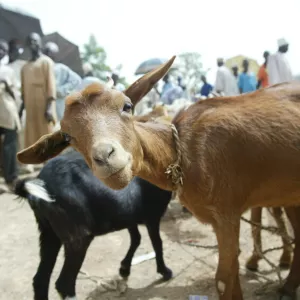Addressing climate risks for Nigerian pastoralists
Nigeria boasts one of the largest livestock populations in Africa, significantly contributing to its agricultural gross domestic product. However, the crucial pastoral production system which encompasses millions of pastoralists faces significant challenges due to climate change. Rising temperatures, erratic rainfall, desertification, and extreme weather events are threatening livelihoods and food security. The International Livestock Research Institute (ILRI) held a one-day

Addressing climate risks for Nigerian pastoralists
Nigeria boasts one of the largest livestock populations in Africa, significantly contributing to its agricultural gross domestic product.
However, the crucial pastoral production system which encompasses millions of pastoralists faces significant challenges due to climate change.
Rising temperatures, erratic rainfall, desertification, and extreme weather events are threatening livelihoods and food security.
The International Livestock Research Institute (ILRI) held a one-day workshop in conjunction with the Centre for Dryland Agriculture at Bayero University Kano, Nigeria under the CGIAR Initiative on Fragility, Conflict and Migration.
The workshop brought together key stakeholders to address the pressing challenges faced by pastoral communities in fragile settings, with the objective of understanding risk perceptions and potential solutions to build long-term resilience.
Understanding the complexities of risk
Participants discussed multifaceted risks including climate change, insecurity, and market volatility.
In his welcome remarks, Jibrin M. Jibrin, director of the Center for Dryland Agriculture highlighted the alarming decline in agricultural productivity in regions like the Kano River basin due to climate change and other factors. He emphasized the urgent need for innovative solutions to build resilience and safeguard livelihoods.
Rupsha Banerjee, institutions and innovation scientist at ILRI, provided an insightful overview of the CGIAR Initiative on Fragility, Conflict and Migration, emphasizing the importance of contextual understanding and risks associated with different social groups.
Mitigating risks requires both financial and non-financial strategies, and community members and local players have critical roles in implementation.
ILRI senior economist Kelvin Shikuku spoke about the impact of non-climate risks including markets, pests, diseases, and conflicts.
He pointed out the need to recognize heterogeneity of social groups as they will be affected differently.
He further stated that due to the complex interrelationships and mutually reinforcing risks, sometimes one solution may not be sufficient and rather a bundle of solutions is needed.
Photo: Goat in a market in Nigeria (ILRI/Stevie Mann)

